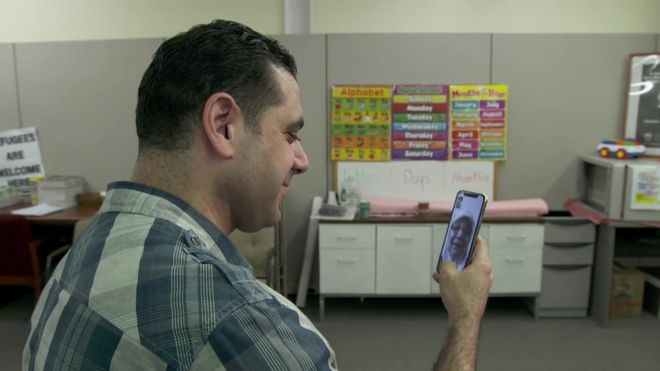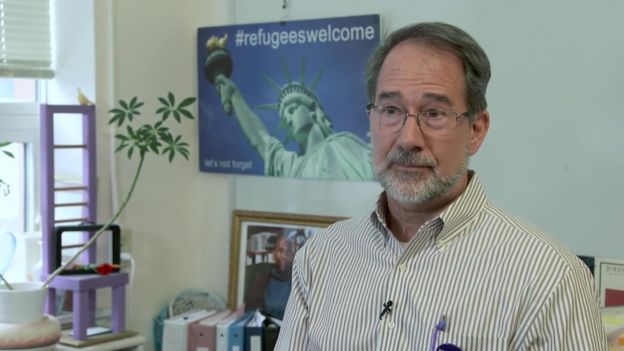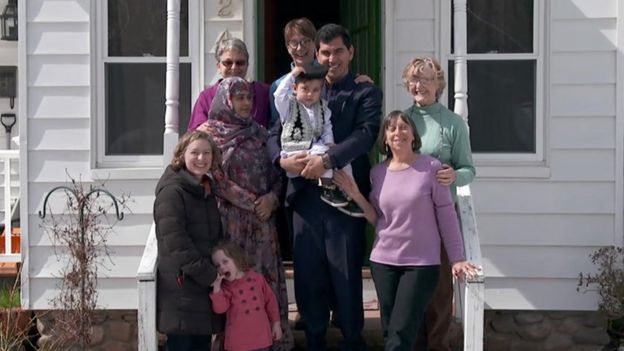
From his new hometown of New Haven, Connecticut, 35 year-old Mohamed Chaghlil calls his elderly mother every day. She asks him if he’s looking after himself, and about his love life. He asks her if she’s getting her medicine, and promises they’ll be re-united soon. But he knows it’s a promise he can’t keep.
Mohamed and his parents escaped from the horrors of the Syrian civil war in December 2012. Taking refuge in Jordan, they applied to settle in the US. In the autumn of 2016, Mohamed’s father died. Shortly afterwards, Mohamed was approved to travel to the US.
It was a hard decision, but Mohamed and his mother believed she soon would join him. So Mohamed made the journey, arriving in America just weeks before President Trump was sworn in.
But Mohamed’s mother was now a widow, meaning checks on her application had to be carried out again. Then came President Trump’s first travel ban. It paused refugee resettlement, and banned Syrian refugees indefinitely. More than a year later, Mohamed’s mother is still waiting.
The administration paused the refugee programme in order to bring in security checks which it said would protect Americans. But even after legal challenges to the travel ban opened the way for reunification cases like the Chaghlils, families are still waiting to see each other again.
- Canada grants asylum to LGBT Chechens
- Banned: An Iraqi family’s immigration story
- Syrian ‘stranded at airport’ for 37 days
“It was already a two-year screening process. I don’t think the new vetting procedures are having an impact on the safety of the US. It’s just a way to delay the programme,” says Mary Giovagnoli, chair of Refugee Council USA. Her group represents America’s refugee resettlement agencies across the country.
RCUSA also claims there’s a bureaucratic go-slow in the screening programme, with fewer refugee interviews being scheduled abroad, and staff being re-assigned elsewhere. What’s happening is “a meticulous effort to dismantle the refugee programme,” she says.
A trickle of refugees
It’s a view shared by Chris George, who runs the office in Connecticut that welcomed Mohamed.

“Most of the refugee programme has been pretty much suspended or slowed down to a crawl. In 2016, my organisation welcomed 530 refugees. We’ll be lucky if we make 200 this year.”
The total number of refugees the US will admit in a year is set by the president. In October 2017, President Trump declared it would be 45,000. That was a significant drop from the cap of 110,000 set by President Obama in 2016, and the lowest cap in nearly 30 years.
In the six months since that cap was set, the US has admitted just 10,548 refugees. That means the US is on course to welcome the lowest number since the modern refugee programme began in 1980.
RCUSA worries that decreasing number of refugees is creating a “vicious cycle”, in which “fewer refugees means they can justify reducing capacity. And then a reduction in capacity justifies accepting fewer refugees”.
More than 20 refugee resettlement offices nationwide are now slated for closure. The Trump administration says consolidating affiliate offices will improve efficiency. And it points out that the US is the top contributor to international organisations assisting refugees.
If resettlement offices close, it could increasingly fall to volunteers to keep alive America’s tradition of welcoming those most in need.
In December 2014, Robin Baslaw heard a radio news story the Syrian civil war and decided to help. She got together volunteers from local synagogues and churches, and helped by Chris George’s refugee office, they had welcomed a family of Afghan refugees to their town of Branford just a month later.

For Robin, the motivation is simple. “We do this to save lives. My mother was a Holocaust survivor from France, and I’m doing the work that others did to get me here”.
Special case
The latest new arrivals to Branford are Zahir, his wife Nooria, and their young son Bahij. Zahir’s work as a translator for the US Marines in Afghanistan made the family the target of attacks from the Taliban. He was nearly shot, and his wife discovered a bomb under their car. They arrived in January.
They came to the US under the Special Immigrant Visa programme which helps people whose lives are in danger as a result of their work with the US in Iraq or Afghanistan. The scheme has continued without significant change under the Trump administration. Since October, there have been 8,020 SIV arrivals.
The family’s new life is everything they dreamed of. Zahir is working. Volunteers helped find a friendly landlord, and furniture for their home. Other volunteers give them English tuition. When a local store donated running clothes, Nooria was able to go for jogs in the neighbourhood – something that wasn’t permitted in Afghanistan.
But Robin’s team worry about the Trump administration’s refugee policy.
“My family were from refugees and their experience was so different,” says Susan Smith. “They were part of a wave that was welcomed. I worry the next generation won’t know that.”
But Chris George remains positive. “We’re up against formidable anti-refugee forces,” he says. “But welcoming refugees is probably the best thing this country does.
“It’s the Statue of Liberty in action. It’s much more powerful than any single president. And it will return, at high, respectable numbers. It will return one day.
source:-.bbc.



